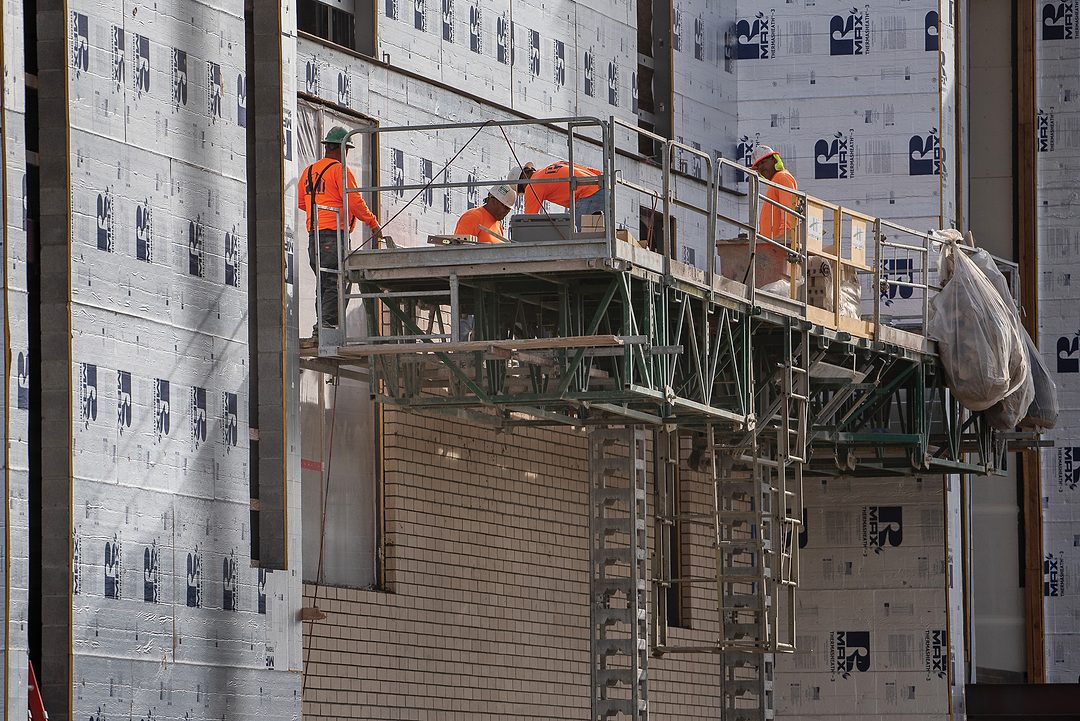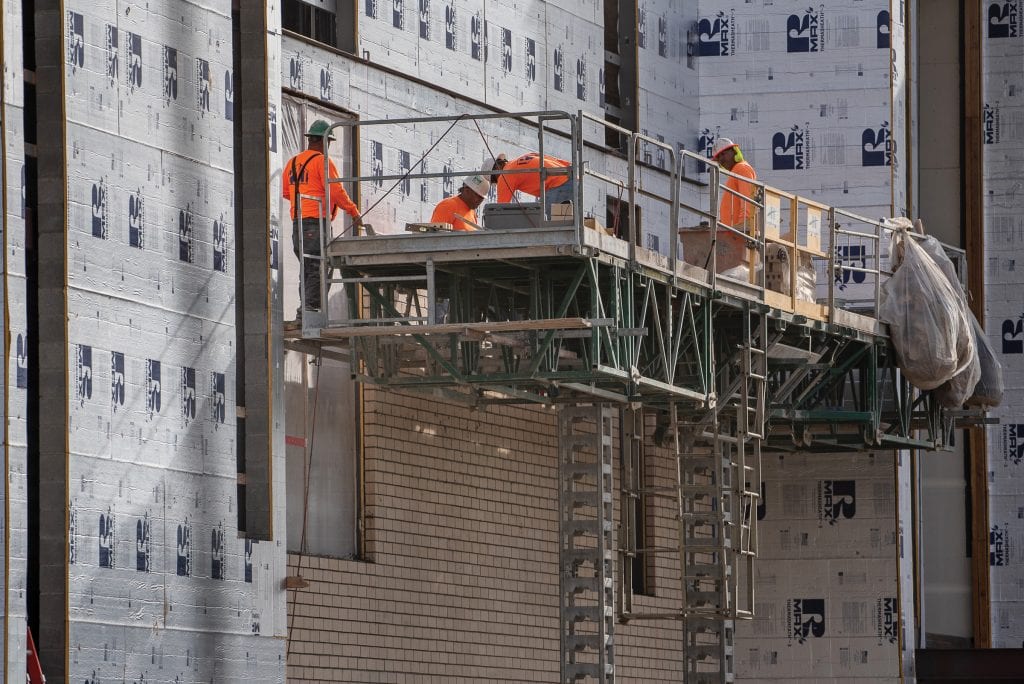
Home » City of Richland: big projects underway in central district
City of Richland: big projects underway in central district

October 30, 2018
The opening of the Queensgate Drive roundabouts allowed Richland to wrap up one of its major capital projects in 2018, while shifting focus for the next six months on building its new City Hall.
The central district is a part of town receiving more attention from the city after a surge of growth in south Richland and the Queensgate area.
Richland’s population grew to 55,320 people in 2018, up 2 percent from the pervious year.
“A lot of our focus has shifted to central Richland,” said N. Zach Ratkai, the city’s former economic development manager who now works for the city of Pasco.
The new $18.5 million Richland City Hall is expected to be completed by spring 2019. It will be an anchor of future improvements to Swift Boulevard that are also on the way. The new building at 625 Swift Blvd. is adjacent to the current City Hall, with an entrance on Swift from a corner lot that intersects Jadwin Avenue.
Richland is combining three facilities into one as part of what the city calls a “one-stop shop” that will “increase convenience for residents.” The building will house staff from City Hall, the administration annex and the development services department.
Work began on a new facility a year ago and the current City Hall, at 505 Swift Blvd., is set for demolition and subsequent site work. This will leave 1.5 acres at Swift and George Washington Way, a highly-visible location, ripe for commercial development.
“We hope to build on an urbanization of that corner,” Ratkai said.
Richland’s economic development staff is expected to market the corner property as mixed-use space, available for retail.
The private property across the street at 502 Swift Blvd., once home to Dupus Boomer’s restaurant, is vacant and seeking a new tenant. The restaurant closed suddenly just before the end of 2017. The property is owned by Markel Properties/Washington Securities and Investment Corp. The company says there are “no current plans in the works” to fill the space.
Ratkai said the city has been in contact with Markel. “Our doors are open to assist (them) and we are willing to help with marketing,” he said.

Prior to launching the new City Hall, Richland hopes to finish improvements to Swift Boulevard that include widening sidewalks, adding bike lanes, on-street parking and decorative lighting.
“These street improvements will dress it up to tie in the anchors of downtown, from the Kadlec tower to recreation areas like Howard Amon Park,” Ratkai said.
The area of focus includes Swift Boulevard between Long Avenue in the west, near Richland High School, and George Washington Way on the east, where the current City Hall has been since 1958.
This could include an eventual relocation of Fire Station 71 at 1000 George Washington Way. Hollie Logan, marketing and communications manager for the city of Richland, said the fire station is not on the same timeline as the replacement of City Hall.
“It is part of the redevelopment efforts the city would like to see occur over the next three to five years,” she said. “What will drive the relocation will be the continued redevelopment of the Swift Boulevard corridor. At some point, the economics will suggest relocating for further economic development.”
The goal of the $1.8 million Swift corridor improvement project is to more readily connect Richland’s downtown core with the Columbia River.
“Richland’s coming around from the place where you work, to the place where you live and play in the urban corridor,” Ratkai said. This includes updates to the city’s central business district, including The Parkway.
This area sitting just west of George Washington Way has slowly transformed from a sleepy strip of office space to a vibrant center that’s home to numerous new eateries.
“The Parkway has stood the test of time and been able to transition to meet the market’s needs,” Ratkai said. “It’s become the focal point for an urban lifestyle and urban recreation.”
Current projects in The Parkway include an expansion of Frost Me Sweet, the debut of Miss Tamale restaurant and the opening of the second Foodies Brick and Mortar, called Foodies too.
“This is clearly an indication of growing consumer demand driven by the revitalization of Richland’s downtown core,” said David Lippes, principal of Boost Builds, the company behind some of the prominent development within the central business district.
Boost Builds rehabbed the aging building where Fuse, a corworking community, is housed in The Parkway, and is a key player in the effort to transform the spot known as “the pit” on George Washington Way into a four-story apartment building with retail space.
Lippes said the pit is still “set to go this fall, just waiting on (Housing and Urban Development) for final financing.”
Lippes and business partner John Crook also intend to redevelop 1100 and 1200 Jadwin Ave., which they bought.
The buildings were once occupied by Fluor Corp. and total more than 150,000 square feet on nearly 10 acres.
The developers hope to transform the larger building, at 1200 Jadwin Ave., into a loft-style, multi-family dwelling. It needs more attention and updating than the smaller building at 1100 Jadwin, which is about two-thirds occupied by commercial tenants.
Ratkai said the city is working behind the scenes with Lippes and Crook on the project.
Richland’s central business district will eventually be linked to Queensgate through the Duportail Bridge. With investments totaling $37 million, the project had a groundbreaking in late February 2018. Since then, the city said work is proceeding as planned.
The bridge is on schedule to open in summer 2020, relieving congestion in spots like the bypass highway and Wellsian Way, and providing improved access between central Richland and the Queensgate area.
More growth could come to Queensgate as the state Department of Natural Resources, or DNR, works with the city of Richland to rezone property north of Vintner Square on Kennedy Road. DNR hopes the six- to nine-month process will result in 54 acres re-zoned for commercial use and still be consistent with the city’s comprehensive plan.
This acreage would be leased for revenue that goes into the state’s Common School Trust and allow for additional development north of the Target shopping complex.
“We also have been in discussions with Richland School District about possibly transferring a 40-acre parcel of the property to the district,” said Bob Redling, communications and outreach officer for DNR. “If that comes about, that 40 acres would be transferred in return for its appraised value. We expect to put the remainder of 334 acres up for public auction at a future date.”
The Queensgate area includes one of the three highest-valued commercial construction projects underway in the city of Richland.
The $5.3 million project at 3200 Duportail St. will be home to Smile Surfers pediatric dentistry office and Tri-City Orthodontics, while allowing tenant space for additional use.
The $18.5 million City Hall holds the highest-valued project presently being built in Richland, followed by the $8.5 million student housing project underway at Washington State University Tri-Cities.
The city of Richland issued 78 commercial building permits between January and June 2018, which includes new construction, remodels or improvements and expansions.
For the same time period, Richland issued 144 permits for single-family dwellings. Most of those permits now cost more, thanks to an increase in road impact fees tied to single-family home construction.
Effective Aug. 1, 2018, the city began adding up to $2,229 onto some building permits for single-family homes to offset the burden of infrastructure support needed for new developments.
The highest priced fees are for homes built in the Badger Mountain South area, off Dallas Road.
Richland’s northernmost boundaries also are seeing an uptick in attention from potential employers that need acreage.
“There’s been a lot of interest in Horn Rapids Business Park,” Ratkai said. “People are also looking at big swaths of land but they’re all off the record. The inquiries are secretive and not on paper. So there’s a lot of nibbling around the edges. We plan to market it hard to get solid, high-paying manufacturing jobs there. We want to diversify the economy and not rely solely on Hanford/PNNL (Pacific Northwest National Laboratory).”
A 30,000-square-foot expansion is also planned for Preferred Freezer Services at 2800 Polar Way, which is already the largest freezer in North America. The expansion would serve Lamb Weston, which built a $200 million Richland addition in 2017 to add two million more pounds of frozen french fries daily to the worldwide market.
A plan to add a 40,000-square-foot facility in Horn Rapids to serve the National Guard is still in need of funding. The National Guard bought 40 acres in Richland with plans to put an Army infantry Stryker company on the space.
Ratkai said the effort to secure government funding has been pushed to 2020 with the intention of starting work in 2022.
Construction + Real Estate
KEYWORDS october 2018





